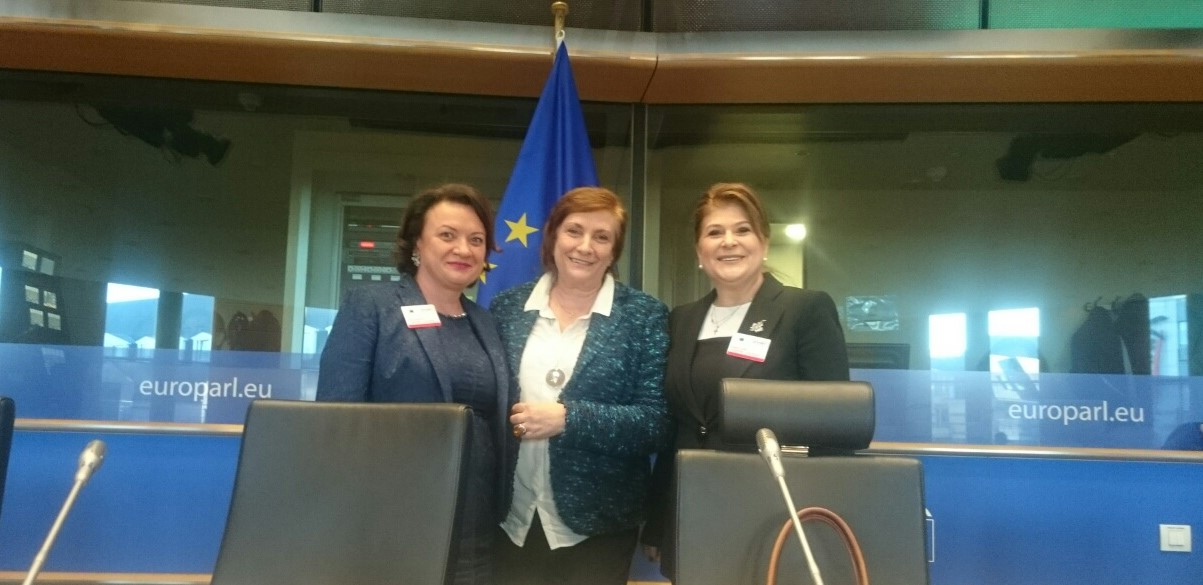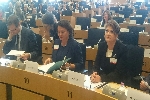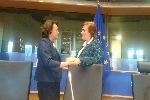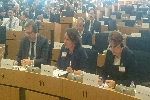News
Ivelina Vasileva: Cohesion policy grants should continue after 2020 22/11/2017
22/11/2017

It is important to maintain the long-term investment nature of the Cohesion policy, despite the changes; it should preserve its priority status in the total EU budget even after 2020, and continue for all EU regions, said Ivelina Vasileva, Chair of the Environment and Waters Committee and Deputy Chair of the Committee on European Affairs and Oversight of the European Funds, at the inter-parliamentary meeting on “The Future of the Cohesion Policy after 2020: opportunities, challenges and next steps”, held in the European Parliament.
She said that contemporary challenges related to Brexit, security and migration, climate change and the development of a digital society, should not shift the focus from economic prosperity and the EU being a key player on the global stage. Our key messages are continuing cohesion, simplification, flexibility and effectiveness, said Ivelina Vasileva.
“It is essential for Bulgaria that the debates are focused on strengthening the effect of investment, which will be equally useful for donors and beneficiaries. A large part of every euro invested into underdeveloped regions under the Cohesion policy comes back to the large Western economies. This is how the cohesion policy contributes to the economic development and growth of the whole EU,” she said.
“The principle of shared governance has no alternative for Bulgaria at this stage. However, it is necessary to make a clearer distinction between the responsibilities of the members states and the European Commission in relation to programming, implementing and controlling EU funds. The member states would also benefit from a streamlined audit approach”, said Ivelina Vasileva.
In her words, flexible combinations between programmes and instruments will be implemented after 2020, such as combinations between Horizon 2020 and the Human Resources Development Programme, or the environment programmes and the European Fund for Strategic Investments. “For as good as financial instruments are, they should be complementary, can be implemented only in sectors with economic potential and established market niches, and cannot replace grants,” said Ivelina Vasileva.
Bulgaria will continue to support the principle of thematic concentration for the achievement of certain strategic goals, said Vasileva and expressed her expectation that after 2020, the ex-ante conditionalities, already introduced, would be bound not only to sanctions but also incentives.

Latest news
- 22/04/2021
The Parliament imposed a moratorium on concessions, real estate deals and appointments pending the election of a new cabinet or caretaker government - 16/04/2021
By 156 votes “in favour”, the National Assembly accepted the resignation of the Council of Ministers with Prime Minister Boyko Borisov - 15/04/2021
Speech by Mrs. Iva Miteva upon her election as a President of the 45th National Assembly - 15/04/2021
The Member of Parliament Iva Miteva was elected President of the 45th National Assembly - 15/04/2021
The Members of the 45th National Assembly were officially sworn in - 03/03/2021
The President of the National Assembly Tsveta Karayancheva and MPs attended the solemn fireworks-retreat on the occasion of the Liberation of Bulgaria - 03/03/2021
Every Bulgarian should preserve and honour the memory of those glorious ancestors, thanks to whom Bulgaria exists today, said the President of the National Assembly Tsveta Karayancheva in Gabrovo - 03/03/2021
Today we are on Shipka to pay our respects to all the heroes who sacrificed their lives for freedom, said the President of the National Assembly Tsveta Karayancheva after climbing Shipka Peak together with young people from all over the country - 02/03/2021
The Vice-President of the National Assembly Valeri Simeonov received an award from the Bulgarian Republican Self-Government in Hungary - 26/02/2021
The Parliament adopted at second reading amendments to the Measures Against Money Laundering Act
 Български
Български English
English




